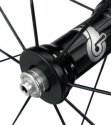Hi all,
I have tubeless set up on 2 sets of wheels - Lightbicycle with DT Swiss 240 hubs and Velocity Aileron wheels. Both are set up as tubeless.
When I spin the Lightbicycle wheel by hand, the wheel stops spinning pretty quickly. I was pretty disappointed at its performance as I have heard how good DT Swiss hubs are supposedly. I then compared them to a Compagnolo Zonda wheelset which spinned much longer, but they were set up with inner tubes. When I tried to spin the Velocity Aileron wheels with tubeless setup, they also seem to stop spnning rather quickly. That had me scratch my head that I cannot be lucky enough to have two sets of expensive slow wheels. I just tested the new Q45's stock wheels with inner tube set up, and they spinned longer than the DT Swiss 240 and Velocity hubs. The Lightbicycle wheels have about 1500 mi. Velocity Aileron wheels have around 1000 mi. Q45 stock wheels have maybe 30 mi.
So now I am thinking... is it because both wheelsets are set up as tubeless with tubeless sealant sloshing around inside the tires when I spin the wheels by hand? Does the sealant's sloshing inside the tire cause additional inertia/drag so that the wheels get slowed down more quickly than with a inner tube setup? Under actual riding, I assume the sealant will coat inside the tires uniformly. Does that then negate the sloshing/slowing effect?
I guess I am just trying to figure out external factor that makes me slow... I should just ride more than once a week to get faster rather than blaming equipment.
I should just ride more than once a week to get faster rather than blaming equipment. 
Michael
I have tubeless set up on 2 sets of wheels - Lightbicycle with DT Swiss 240 hubs and Velocity Aileron wheels. Both are set up as tubeless.
When I spin the Lightbicycle wheel by hand, the wheel stops spinning pretty quickly. I was pretty disappointed at its performance as I have heard how good DT Swiss hubs are supposedly. I then compared them to a Compagnolo Zonda wheelset which spinned much longer, but they were set up with inner tubes. When I tried to spin the Velocity Aileron wheels with tubeless setup, they also seem to stop spnning rather quickly. That had me scratch my head that I cannot be lucky enough to have two sets of expensive slow wheels. I just tested the new Q45's stock wheels with inner tube set up, and they spinned longer than the DT Swiss 240 and Velocity hubs. The Lightbicycle wheels have about 1500 mi. Velocity Aileron wheels have around 1000 mi. Q45 stock wheels have maybe 30 mi.
So now I am thinking... is it because both wheelsets are set up as tubeless with tubeless sealant sloshing around inside the tires when I spin the wheels by hand? Does the sealant's sloshing inside the tire cause additional inertia/drag so that the wheels get slowed down more quickly than with a inner tube setup? Under actual riding, I assume the sealant will coat inside the tires uniformly. Does that then negate the sloshing/slowing effect?
I guess I am just trying to figure out external factor that makes me slow...
Michael




